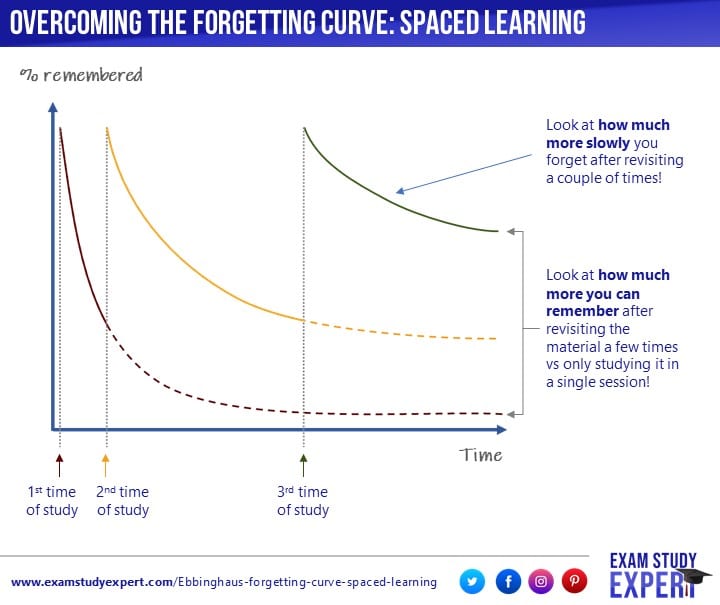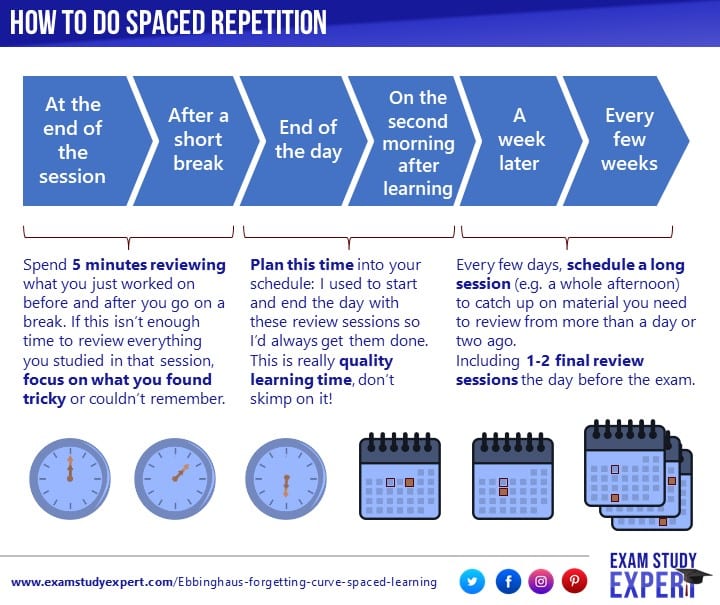Spaced repetition (or as it’s more commonly known to memory psychologists, “spaced learning”) is one of the most powerful and flexible of all memory strategies.
If you have knowledge to learn for your course, I would consider spaced learning to be a mandatory technique in your study strategy.
We all forget things over time – that’s Ebbinghaus’ Forgetting Curve.
Spaced repetition is the solution.
It’s an easy principle to understand, but a surprisingly tricky one to actually put into practice well if you don’t know what you’re doing.
This article will teach you all you need to know about spacing your learning out, for spectacular results!
What is spaced reptition?
Spaced repetition / spaced learning (I’ll use the two terms interchangeably) simply means revisiting a piece of learning at spaced intervals, with a time lag in between.

For example, let’s just say you learned the French words for different colours. If that’s the only time you ever use that knowledge, you will eventually forget them. It might happen as soon as a few hours later, it might be a few weeks away. But forget them you will – unless you add in some spaced reptitions.
Here’s how it might look in practice:
- Repetition 1: Right after the learning session, take a short break, then test yourself on the new words straight away, before you go on to the next thing on your to-do list.
- Repetition 2: Test yourself again either later that day or the following morning.
- Finally, Repetition 3: Test yourself a third time a few days later – perhaps at the end of the week
- Subsequent spaced repetitions: keep testing yourself every few weeks until the knowledge has either served its immediate purpose (e.g. you’ve taken the exam), or you need to prioritise your time on revisiting new knowledge you know much less well than you now know your colours.
Spaced learning should be “spaced RETRIEVAL PRACTICE”
So what should I actually be doing in each of these “spaced” study sessions?
99% of the time: retrieval practice: “testing yourself”. (That’s why in the example of a spaced repetition schedule above, I wrote “test yourself” each time.)
If you don’t know what retrieval practice is or how to unleash its incredible power to greatest effect in your studies, check out my previous article for all you need to know on how to memorise for exams.
Retrieval practice and spaced learning are like hot chips and salt.
Like strawberries and cream.
Like ice cream and hot chocolate sauce.
Most of these are excellent ingredients in their own right, and to be highly recommended. But put them together, and something magical happens.

For any aspect of your studies that involves committing things to memory – learning vocabulary and grammar; tables and diagrams; names and dates; definitions; formulas; facts; lists; numbers; processes – you should predominantly be using retrieval practice and spacing together.
Do retrieval practice sessions, but space out your retrieval practice on a single topic over multiple days.
How to do actually do spaced repetition when studying: your questions answered
How many times do I need to practise?
For durable and long-lasting memory, some scientists recommend 5-7 correct retrievals; others 3-4 retrievals. A “correct retrieval” is one instance of self-testing which you got right – for example, remember what was on the back of a flashcard, or getting a self-quiz question right.
For me, I’d say it depends on the complexity of the information you’re trying to remember: long foreign words, big equations, complicated enzyme processes; they’ll all be forgotten more easily, so you should do more retrieval attempts to solidify them in memory.
I always like to do a final round of retrieval practice on all the main topics the day before a big exam or test, if possible, to make sure it’s all fresh.
How do I know when to do my spaced repetition sessions?
An “expanding” spaced learning routine seems to offer the best memory benefits and be most practical: that just means making the gaps between each practice session longer each time.
There’s no hard and fast rule for exactly how much time you should leave – I’d generally say if you can accurately remember less than 50% of the material, try leaving shorter gaps. If you can remember more than 90%, try leaving longer gaps.
At college, I generally used the following schedule, which served me well:

But my way to overcoming the forgetting curve is to CRAM! Why should I bother with spaced learning?
Well, sure. You can get through your exams by cramming in the days leading up to it. But:
- As spaced learning is more efficient, you’ll actually need to spend more hours cramming in the run-up to the test to get your knowledge up to the equivalent standard than if you’d spread those study hours out more.
- Because you’re condensing all that study time into such a short space of time, you’ve got no margin for error. What if you’re ill? What if a family emergency strikes?
- And even without a major upset, an intensive cram will take over your life, and likely eat into your sleep, leaving you stressed and tired – not good conditions for either learning or exam-taking!
- If you used spaced learning, that Ebbinghaus forgetting curve will turn into a shallow-sloping retention curve, meaning you can enjoy access to more of that knowledge for much longer. Handy if you’re going on to further study in that subject or a related one.
There’s some evidencethat crammers tend to perform less well academically than students who plan their study schedules in advance, especially if that means they’re studying late into the night.
Can I use spaced repetition through the year, not just at exam time?
Sure! That would be a great idea.
One tip I came across in Understanding How We Learn – which is one of my favourite books, and one of the few I would highly recommend to any teacher or a keen student at college / University level – is to spend some time reviewing information from each class, but not immediately after the class.
If you have Physics classes on Monday and Thursday, for instance, make some time to review what you did in these classes on a Tuesday and Friday, one day after each class. I’d suggest starting by trying to write down any key points or fragments of knowledge that you can remember, even if they’re incomplete, then review your notes and refresh your memory of what you covered.
How will it feel when I start using spaced repetition?
Probably quite tough!
Spaced learning feels more difficult than doing it all on one day, because your memory has started to fade in the intervening time period, and so it becomes harder to remember what you learned. As the authors of Make It Stick put it, “It feels like you’re not really getting on top of it, when in fact the opposite is happening: as you reconstruct learning from long-term memory, as awkward as it feels, you are strengthening your mastery as well as your memory.”
Stick with it, persevere, and embrace the challenge: and your learning will be far more long-lasting as a result.
I’m excited for you: good luck!
Oooh, and before you go… grab your copy of my “Science of Learning Cheat Sheet”: all my favourite strategies from the psychology of learning and memory to help you study smarter, and ace your exams. It’s free – my little gift to you.
Enjoy.
- [PODCAST] Peps McCrea: Hacking Study Motivation With Psychology - 27 Jan 2024
- Your Word Of The Year – Setting You Up For Success [PODCAST] - 2 Jan 2024
- Holiday Season Study Tips [PODCAST] - 21 Dec 2023




Would like to share my learning disability. I’m 77 and past any interest in returning university studies. I flunked out of all of my attempts at university (5 all in all). This technique would have helped me (and any current students like me). I am diagnosed severe ADD. When I read a paragraph (any topic) I cannot even tell you the subject matter when I’m done (forget reading an entire chapter). It was so frustrating when I was a student (1962). I would read paragraphs/pages over and over and could hardly remember that I read it let alone the content. The only reason I made it through year one of each institution was because I remember auditorally. I could remember what I heard in lecture. Now at advanced age I’ve learned some tricks to remember what i learn (I’m practicing a new language) and your techniques help considerably. Wish I had this information 60 years ago! Glad you are spreading the knowledge.
Thanks so much for taking the time to share your story! This is wonderful.
Best wishes with the language learning 🙂